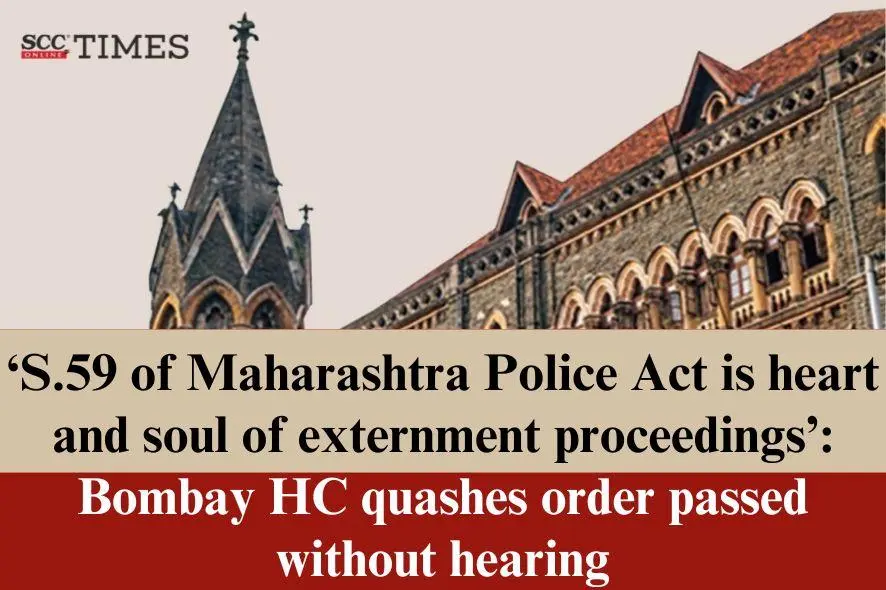Bombay High Court: A writ petition was filed challenging the externment order passed by the Sub Divisional Police officer under Section 56(1)(a)(b) of the Maharashtra Police Act, 1951 (‘the Act’), on the ground that it was issued without giving the petitioner any opportunity of hearing. The order was based on7 criminal cases,wherein the petitioner was accused of various offences under Penal Code, 1860 (‘IPC’).
A Single Judge Bench of M.M. Nerlikar, J., held that following the procedure enshrined under Section 59 of the Act which included giving opportunity of hearing before passing the order, is mandatory, violation of the same resulted in the breach of fundamental right given under Article 19 of the Constitution of India. The Court opined that both the adjudicating authorities passed the order without application of mind as they failed to consider that the petitioner was discharged from 5 of the cases and also did not consider the in-camera statements. Hence, the Court held that it is a plight that the fundamental right of the petitioner was curtailed on the stale grounds, therefore, the Court quashed and said aside the externment order.
Background
The petitioner was externed from two districts, for 6 months, by the order of Sub Divisional Police Officer, passed under Section 56(1)(a)(b) of the Act. The order of externment was based on 7 criminal proceedings in which the petitioner was an accused. The petitioner was acquitted for the offence under Section 302, 34 of Penal Code, 1860, while 6 other cases were pending against him, for various offences enshrined under IPC.
The petitioner contended that the procedure given under Section 59 of the Act was not followed as he was not given the opportunity of hearing before passing the externment order. Therefore, the petitioner filed an appeal which was rejected by the Appellate Authority. Aggrieved by the same, the petitioner filed a writ petition before the present Court.
Analysis, Law and Decision
The Court observed that the externment proceedings under Section 59 of the Act was the only proceeding wherein the Sub Divisional Police Officer or the Assistant Commissioner of Police had to consider the truthfulness of the allegations made in the proposal in detail. The said section casted a duty upon those officers to consider the entire material on record and verify the confidential statements. Thereafter, as per the procedure, the officers needed to call explanation from the externee, by issuing a notice under Section 59 of the Act, which contemplated a gist of allegations against the externee. Thus, the Court opined that Section 59 of the Act is the heart and soul of the externment proceedings, and violation of such mandatory provision amounts to violation of Article 19(d) of the Constitution, as well as principles of audi alteram partem.
The Court observed that in the instant case when the enquiry was conducted under Section 59 of the Act, the Sub Divisional Police Officer, had issued notice, but failed to consider that whether the notice was served on the externee. Therefore, the petitioner did not get the opportunity of hearing before passing the order on the sale grounds of cases of the year 2000, 2009, 2010 and 2013, wherein the petitioner was accused. The Court also specified that mere reference to the number of cases the petitioner was accused in, was not sufficient, rather it was necessary to record reasons as to how those referred cases were sufficient to extern the petitioner. Additionally, the order failed to consider the in-camera statements as mentioned in the report made under the said section, by the Sub Divisional Police Officer.
The Court observed that the Appellate Authority dealt the matter in a mechanical and causal way even though the petitioner specifically pleaded that he was acquitted or discharged in 5 out of 7 crimes he was accused in. It was emphasised that the very object of Section 60 of the Act for appeal would be of no use if the appeals were rejected or dismissed without going into their merits, and without application mind. Therefore, the Court opined that both the authorities did not consider the material placed before them and utterly failed to subjectively satisfy themselves before passing the said order.
The Court also emphasised that when a question of fundamental right guaranteed under Article 19 of the Constitution of India is involved, it is the duty of all officers concerned, who are dealing with the matters to be sensitive before passing of any order. Therefore, the order was said to be against the mandate of Section 56(1)(a)(b) of the Act and not following the mandate of the said section resulted in violation of Article 19(d) of the Constitution of India which could only be curtailed by following due procedure of law.
Accordingly, the Court held that not following the mandate of Section 59 which is the heart and soul of the Act, by not giving the opportunity of hearing to the petitioner had resulted into violation of Article 19(d) of the Constitution of India. It was also held that the authority failed to consider the in-camera statements and passed the order on stale grounds even though the petitioner specifically mentioned that he was acquitted or discharged in the 5 cases, yet the order was passed in a very mechanical and casual way without giving any cogent reason and application of mind. Hence, the Court quashed and set aside the externment order passed against the petitioner as the officers had utterly failed to give reasons for passing the said order.
[Bharat Shatrughana Bhosale v. Commr., 2025 SCC OnLine Bom 3283, decided on15-9-2025]
Advocates who appeared in this case:
Advocate for the Petitioner- P.N. Lakhani, Advocate
Advocate for the Respondents- S.V. Kolhe, A.P.P.




